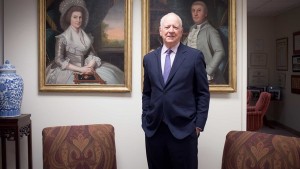I was going through my normal browsing routine of the Financial Times today and found an interesting article in the management section entitled “The psychiatrist of finance” which was a small story on a man named Peter Solomon. The piece talked about how Mr. Solomon’s career evolved during his career and how he has preferred a way of doing business that involves close relationships and empathy with potential and current customers. I actually felt that the piece was extremely good for any MBA student to read because it reminds us that even in today’s environment of ever more automated relationships that a human connection can be the difference between success and failure as well as necessary to ensure a long relationship with clients.

As I sat here pondering the deeper meaning of the moral of this story, I realized that the subject of the article has a point that should be heard. In fact, it can even be seen as a strong strategy that provides a competitive edge. More and more services such as investment banking are becoming a commodity. This causes firms to essentially race each other to the bottom of the profitability ladder. Firms continue to find ways to cut expenses which usually means cutting out the human factor in exchange for higher levels of automation. But the question to ask is, why? Why do firms automatically start assuming that these short term moves will help in the long term? As a product becomes a commodity, it no longer brings about a sense of product loyalty to it. A perfect example of this is how investment banking is becoming cheaper and cheaper for firms and no longer draws the same loyalty that it once did. The relationships that Mr. Solomon has built over the ages are essentially what cause consumers to stay with a company in the long term. Just look at how when a financial advisor moves to another firm, many of this clients will go with him or her.
In the article, Peter Solomon recalls an incident when one of the employees of his firm was so involved on her smartphone that she walked directly between the President and Chairman of her firm without even realizing it. After getting her attention, he says to her “You just walked between the chairman and the president of your company. Are you going to observe the world around you, or ignore it?” This small story really gets to the heart of a disease of mass automation within the entire business community. Firms are so involved in automating out the human capital that they are losing their edge in being able to find hidden gems of opportunity that a computer cannot discover. This really goes beyond the usage of customer loyalty programs that attempt to entice consumers with financial rewards, this goes to the heart of the interaction between two people, regardless of their social positions or status. While CRM systems can only attempt to use algorithms to attempt to discover patterns leading towards better sales and client management, the ultimate tool to that better relationship is the salesperson or service rep themselves and their ability to empathize with clients and their concerns.
Just looking in my industry, I can easily pick out a perfect example of this. If say an asset manager is offering service to their client but they simply are offering a commodity, they may continue to retain that line of business but no growth will be established. If that same asset manager ensured they kept a working relationship with that same firm, they might find other opportunities such as asset based lending, underwriting, etc. All of these further deepen the client’s loyalty to the firm and almost build a feeling of guilt to go elsewhere. Going even closer to home, I easily recall how my Father will go to the same mechanic faithfully for years and years because of the relationship that was established of trust. Loyalty like that is simply unquantifiable to any firm and can be the savior in the worst economic times.
What do you think? Can you name a few examples in your own industries of how such loyalty and relationship building are either being forgotten or used to build stronger ties to the client?
Sources:
Financial Times: The psychiatrist of finance by David Gelles
http://www.ft.com/intl/cms/s/0/c003d782-447d-11e2-8fd7-00144feabdc0.html#axzz2FLyAGX4q
Entrepreneur.com: 5 Ways to Take Customer Loyalty to the Next Level by Jonanna Lord
http://www.entrepreneur.com/article/224117